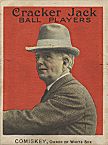| Entries |
| B |
|
Black Sox Scandal
|

|
Bibliography
Asinof, Eliot.
Eight Men Out: The Black Sox and the 1919 World Series.
1963.
Burk, Robert F.
Never Just a Game: Players, Owners, and American Baseball to 1920.
1994.
Riess, Steven A.
Touching Base: Professional Baseball and American Culture in the Progressive Era.
1980.
The Electronic Encyclopedia of Chicago © 2005 Chicago Historical Society.
The Encyclopedia of Chicago © 2004 The Newberry Library. All Rights Reserved. Portions are copyrighted by other institutions and individuals. Additional information on copyright and permissions.
The Encyclopedia of Chicago © 2004 The Newberry Library. All Rights Reserved. Portions are copyrighted by other institutions and individuals. Additional information on copyright and permissions.